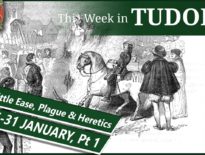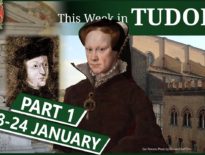Part 2 of "This week in Tudor History" covers Tudor history events from 22nd to 24th January.
22nd January 1561, in the reign of Queen Elizabeth I - The birth of politician, philosopher, author and scientist Francis Bacon at York House, the Strand, London. Bacon is known as "the Father of the Scientific method" and Baconians believe that he was the true author of some or all of William Shakespeare's plays.
23rd January 1570, in the reign of Queen Elizabeth I - The assassination of James Stewart, 1st Earl of Moray, the illegitimate son of James V, half-brother of Mary, Queen of Scots, and a man who was acting as regent for his half-nephew, King James VI. He is famous for being the first head of government to be assassinated by a firearm.
24th January 1503 - The laying of the foundation stone of King Henry VII's Chapel, a large Lady Chapel at Westminster Abbey, which became the resting place of 15 kings and queens.
Henry VII's Chapel - https://www.westminster-abbey.org/about-the-abbey/history/lady-chapel
Virtual tour of Westminster Abbey - https://www.westminster-abbey.org/learning/virtual-tours
These are the videos I mentioned on Bacon's brother and father:
Previous years' videos:



I highly recommend Alexandra Sampson Mary and Philip, the excellent work on the marriage of the Queen and Prince Philip as he was and that this was a xenophobic rebellion, not a religious one.
The declaration called Mary their gracious lady and the Council her evil advisers. One didn’t blame the King or Queen, I suppose that’s in case you lost.
I would recommend the biography of Edward Seymour by Margaret Saud for a good read on the Protector.
It was very moving when we visited the Royal Tombs, the coffins are beautiful if plain, a real contrast. It must be almost 30 years ago now.
We were on a private guided tour and they put step ladders at the side so you can see the top. Our guide also allowed photography because she had a permit. I must admit the post cards were much better although I did have a couple from the tiny vaulted chapel downstairs. It’s quite a contrast and a surprise but I prefer the simple little chapel. The coffins are wonderfully preserved, I wonder what wood they used. The simple flowers are pretty.
Thanks for sharing your lovely photos and pictures.
Nearly every historian says that Henry fell, was unconscious for two hours, his horse fell on him, thus he was brain injured as a result. Thus you would think all the sources agreed on this. Dr Ortiz was in Rome and was a third hand source but the people in England don’t mention the King being unconscious for two hours. So was Henry hurt. I believe he was because he definitely fell from his horse, in full armour and the horse would be in full armour, at a speed of 30 miles an hour plus. The other horse and rider and lance would have impacted him at the same speed so we are talking about the equivalent of two cars having a head on collusion today, enough speed to actually kill. Even a one horse collision, the horse slipping and rolling onto Henry would have been serious. Henry was definitely hurt, no matter what the sources said. Having fallen at full gallop, fortunately rolling out of the way before the horse rolled onto me, I know the sort of impact you can have. Adding horse and rider in full armour I dare not think of the weight on top of him.
Now what injury do we think Henry suffered? A frontal lobe injury could from the impact, the brain would be bounced around. Was Henry unconscious? Probably he was out for a few moments and one month later it had been exaggerated to two hours, like Chinese whispers. Perhaps Henry suffered a leg injury as he was attended for one soon afterwards and that would not be visible in armour. The sources on the ground obviously contradicted Dr Ortiz so we must interrogate the witness of those sources and three say he took no hurt, at least no visible hurt. Whatever the truth Henry was a different man afterwards.
Henry suffered more than one head injury and the contrast with ball players is a good one. We now have concerns in English football that repeatedly heading the ball, especially in the Academy, as children join our football Academies from the age of eight, leads to early dementia. The death of Liverpool and England goalkeeper Ray Clemance last year and others from the old school of 1970s football prematurely has highlighted this problem. It must be added, however, that Clem also had prostate cancer, the biggest killer in men. It was a particularly aggressive type. However, many others have died with dementia. This isn’t old age dementia and is associated with odd personality behaviour. The F.A forbade children under sixteen heading the ball last year and are looking at removing it from the game which is a very big problem as one third of goals are scored with the head.
In America the problem of brain injury and early dementia has been recognised for a good few years now, with more safety rules and better head geer. Hitting someone around the head is also recognised as a cause of brain injury. The associated brain injuries can be sudden or gradual as can the personality changes which follow. I do see an increase in personality changes afterwards, although there is also evidence that Henry was becoming more ruthless and more cruel before this. I think the injury was such that it jolted his brain, bang, crash, wallop, thus triggering more complex and unpredictable personality changes over the months and years which followed. A number of injuries may well have stacked up over years of head injuries, but this impact might have been the one that had the lasting damage. One could also argue that other circumstances fed into the changes in Henry, the accident bringing them out more sharply or worse than before. Already existing problems are also sometimes made worse by a brain injury. We might for example consider how many years of a long and bitter divorce might affect someone, and yes, I know it was an annulment, but it still took seven years and it wasn’t a happy outcome. The morality tale of Kramer v Kramer or The Wars of the Roses, where both parties ended up dead, with Danny de Vito as the lawyer, come to mind. Henry faced a lot of popular opposition to his marriage to Anne and his abandonment of Queen Katherine. He ended up breaking the country from Rome, something very traumatic to the sixteenth century devout mind and he usurped the power of the Church. We might consider that this power itself corrupted Henry. He was determined not to face more opposition after he married Anne and his legislative powers before Parliament ensured he would not, making such opposition treason. The blow to his brain in 1536, regardless of if he was unconscious or not, and as we can see, the sources throw doubt on these claims, would have pushed him over the edge. I would argue it made worse what had been going on for at least four years, although the Henry prior to 1532 or 1534 was a different animal altogether.